
Frattura ed Integrita Strutturale-Fracture and Structural Integrity
Scope & Guideline
Fostering Collaboration in Material Integrity
Introduction
Aims and Scopes
- Fracture Mechanics and Structural Integrity:
The core focus of the journal is on fracture mechanics, emphasizing the analysis and prediction of crack initiation and propagation in materials and structures. This includes classical approaches as well as modern computational techniques like the Extended Finite Element Method (XFEM) and Cohesive Zone Modeling (CZM). - Material Behavior under Load:
The journal publishes research on the mechanical properties of various materials, including metals, composites, and concrete, particularly under conditions of stress, fatigue, and impact. This involves experimental studies, numerical simulations, and theoretical modeling. - Innovative Testing and Monitoring Techniques:
A significant area of interest is the development and application of advanced testing techniques and monitoring systems for structural health assessment. This includes machine learning algorithms for damage detection and remote sensing technologies. - Additive Manufacturing and Material Optimization:
There is a growing emphasis on the effects of additive manufacturing processes on material properties and performance. Research often focuses on optimizing manufacturing parameters to enhance the mechanical characteristics of components produced via these techniques. - Sustainability and Innovative Materials:
The journal also addresses sustainability in engineering by exploring the use of recycled materials, bio-based composites, and self-healing materials, reflecting a trend towards environmentally friendly practices in structural engineering.
Trending and Emerging
- Machine Learning and AI in Structural Health Monitoring:
There is an increasing trend towards utilizing machine learning algorithms and artificial intelligence for structural health monitoring and damage detection. This shift reflects the industry's move towards data-driven decision-making and predictive maintenance strategies. - Additive Manufacturing Innovations:
Research focusing on additive manufacturing techniques is on the rise, particularly studies that explore the mechanical properties of additively manufactured components and optimization of printing parameters. - Advanced Composite Materials:
The exploration of advanced composite materials, including their fracture behavior and mechanical properties, is gaining momentum. This includes the development of bio-based composites and hybrid materials that offer improved performance. - Sustainability in Engineering Practices:
A growing emphasis on sustainable engineering practices is evident, with research focusing on the use of recycled materials and environmentally friendly composites, reflecting the industry's commitment to sustainability. - Dynamic Loading and Impact Analysis:
There is an increasing focus on dynamic loading conditions and impact analysis, with studies investigating the performance of materials and structures under realistic loading scenarios, including blast and seismic events.
Declining or Waning
- Classical Fracture Mechanics:
Although still relevant, traditional approaches to fracture mechanics are being overshadowed by more advanced computational techniques and machine learning applications. Research utilizing classical methods without integration of modern technologies is becoming less frequent. - Basic Material Testing:
There seems to be a waning interest in basic mechanical testing of materials without a focus on advanced applications or contextual relevance, such as specific structural applications or innovative materials. - Historical Case Studies:
While historical analyses of structural failures and case studies were once common, there is a noticeable decrease in such publications, likely due to a shift towards more predictive and proactive approaches in structural health monitoring. - Static Loading Analysis:
Research focusing solely on static loading conditions is becoming less prevalent. There is a growing preference for studies that encompass dynamic loading, fatigue, and real-world applications that reflect the complexities of modern engineering challenges.
Similar Journals
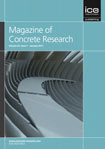
MAGAZINE OF CONCRETE RESEARCH
Exploring the Foundations of Concrete TechnologyThe Magazine of Concrete Research, published by Emerald Group Publishing Ltd, is a pivotal journal in the fields of Building and Construction, Civil and Structural Engineering, and Materials Science, boasting an impressive track record since its inception in 1949. As of 2023, it holds a Q2 category ranking across its related disciplines, indicating its strong influence and credible contributions to the field with Scopus ranks placing it favorably among its peers. With an emphasis on advancing knowledge surrounding concrete technology and construction practices, this journal serves as a key resource for researchers, industry professionals, and students alike. Though not Open Access, the Magazine of Concrete Research continues to cut through the complexities of concrete-related innovations, inspiring advancements in both academic research and practical applications. Engage with the latest findings and technological developments in concrete research, ensuring you stay at the forefront of this essential field.
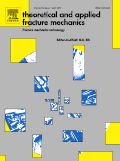
THEORETICAL AND APPLIED FRACTURE MECHANICS
Driving excellence in theoretical and applied research.THEORETICAL AND APPLIED FRACTURE MECHANICS, published by Elsevier, is a leading journal dedicated to advancing the field of fracture mechanics through rigorous theoretical and experimental research. With an impressive impact, the journal holds a Q1 categorization across multiple disciplines, including Applied Mathematics, Condensed Matter Physics, Materials Science (miscellaneous), and Mechanical Engineering, highlighting its importance in bridging various domains of science and engineering. The journal's ranking within the Scopus database, including 96th percentile in Applied Mathematics and 88th percentile in Mechanical Engineering, underscores its vital contribution to scholarly dialogue and knowledge dissemination. Although it currently does not offer open access, THEORETICAL AND APPLIED FRACTURE MECHANICS maintains a commitment to high-quality publication, aiming to foster interdisciplinary collaboration and innovation in the study of fracture mechanics from 1984 to 2024 and beyond. Researchers, professionals, and students engaged in examining the mechanics of materials will find valuable insights and cutting-edge studies within its pages.
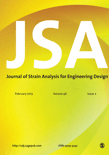
JOURNAL OF STRAIN ANALYSIS FOR ENGINEERING DESIGN
Pioneering Research in Mechanics and Materials Engineering.The Journal of Strain Analysis for Engineering Design, published by SAGE Publications Ltd, is a prestigious academic journal that has been at the forefront of *engineering and applied mathematics* research since its inception in 1965. With a focus on the intricate analysis of strain in engineering design, this journal serves as a vital resource for researchers and professionals seeking to push the boundaries of understanding in mechanics and materials engineering. As of 2023, it enjoys a respectable ranking in its respective fields, including Q2 in *Mechanical Engineering* and *Mechanics of Materials*, and Q3 in *Applied Mathematics* and *Modeling and Simulation*, reflecting its significant contribution to the academic community and relevance in practical applications. Although it is not an open-access journal, its rigorous peer-review process ensures the dissemination of high-quality research. The journal provides a platform for innovative ideas and methodologies, fostering advancements in engineering design and analysis vital for both academia and industry. By bridging theoretical foundations with real-world applications, the Journal of Strain Analysis for Engineering Design remains an essential publication for those dedicated to addressing the complexities of modern engineering challenges.
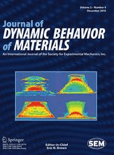
Journal of Dynamic Behavior of Materials
Advancing Research in Material MechanicsThe Journal of Dynamic Behavior of Materials, published by SpringerNature, serves as a premier platform for the dissemination of innovative research in the fields of materials science and mechanics of materials. With its ISSN 2199-7446 and E-ISSN 2199-7454, this international journal has established itself since its inception in 2015, showcasing groundbreaking insights into the dynamic properties and behaviors of various materials. Operating from Switzerland and headquartered in London, this journal embraces an open-access philosophy, albeit not entirely, to enhance research visibility. According to the Scopus rankings, it is positioned in the Q3 quartile for both materials science and mechanics of materials, indicating its growing prominence in the academic landscape. Researchers and professionals alike benefit from its wide-ranging contributions that address contemporary challenges and advancements, making it a critical resource for advancing knowledge and innovation in these crucial fields.
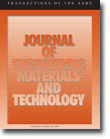
JOURNAL OF ENGINEERING MATERIALS AND TECHNOLOGY-TRANSACTIONS OF THE ASME
Pioneering advancements in engineering materials and applications.JOURNAL OF ENGINEERING MATERIALS AND TECHNOLOGY-TRANSACTIONS OF THE ASME is a premier journal published by the American Society of Mechanical Engineers (ASME), dedicated to advancing the field of engineering materials and technology. With an ISSN of 0094-4289 and E-ISSN 1528-8889, this journal has provided invaluable insights since its inception in 1973. Operating from its headquarters in New York, United States, it serves a global audience of researchers, professionals, and students alike. The journal is recognized for its rigorous peer-review process and its commitment to disseminating high-quality research, currently holding a Q3 quartile ranking across multiple categories including Condensed Matter Physics, Materials Science, Mechanical Engineering, and Mechanics of Materials. With a focus on exploring innovative materials and their applications, it aims to foster collaboration and discovery in the engineering community. Although it is not an open-access journal, it continues to play a vital role in shaping the future of engineering materials research up to 2024. Researchers and practitioners will find in this journal a significant platform to support the development and understanding of engineering materials, making contributions that resonate through academia and industry.
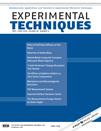
EXPERIMENTAL TECHNIQUES
Navigating the Dynamics of Experimental MechanicsEXPERIMENTAL TECHNIQUES, an esteemed journal published by Springer, serves as a crucial platform for fostering innovation and research in the fields of Mechanical Engineering and Mechanics of Materials. Established in 1975 and continuing its legacy through to 2024, it aggregates a wealth of studies that exemplify rigorous experimental methodologies and emerging technologies. With its remarkable standing as a Q2 journal in Mechanical Engineering and Q3 in Mechanics of Materials, it ranks in the top half of its categories on Scopus, indicating its relevance and impact in the academic community. While the journal is not open access, it ensures accessibility to high-quality research findings essential for advancing knowledge and expertise among researchers, professionals, and students alike. EXPERIMENTAL TECHNIQUES continues to be a vital resource for those involved in the dynamic landscape of experimental mechanics, aiming to push boundaries and explore new frontiers in engineering.

FATIGUE & FRACTURE OF ENGINEERING MATERIALS & STRUCTURES
Exploring the Limits of Material EnduranceFATIGUE & FRACTURE OF ENGINEERING MATERIALS & STRUCTURES, published by WILEY, is a leading journal in the domains of materials science and mechanical engineering, with a solid reputation for advancing research on the behavior of materials under fatigue and fracture conditions. With an impressive impact factor and ranking in the top quartiles of its categories in 2023, this journal serves as a vital resource for academics, professionals, and students interested in the intricate mechanics of materials. The journal encompasses a comprehensive scope, covering both experimental and theoretical methodologies designed to understand and predict material performance under various loading conditions. As the journal continues to thrive since its inception in 1979 and is set to converge until 2024, it remains an essential platform for disseminating innovative and crucial findings in this specialized field. Researchers are invited to explore the wealth of knowledge presented within its pages, paving the way for enhanced engineering practices and material design.
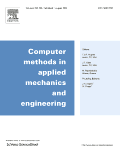
COMPUTER METHODS IN APPLIED MECHANICS AND ENGINEERING
Elevating Knowledge in Computational Methods and Mechanical Engineering.COMPUTER METHODS IN APPLIED MECHANICS AND ENGINEERING, published by Elsevier Science SA, is a premier journal that has significantly contributed to the fields of computational mechanics, computer science applications, mechanical engineering, and the mechanics of materials since its inception in 1972. With an ISSN of 0045-7825 and an E-ISSN of 1879-2138, this journal is recognized for its rigorous peer-review process and is consistently ranked in the Q1 quartile across multiple categories, including Computational Mechanics and Mechanical Engineering. Its impressive Scopus rankings place it in the top tiers of its field, with a percentile ranking of 98th in Computational Mechanics. Researchers, professionals, and students will find the journal's comprehensive scope and high-quality articles invaluable for advancing their knowledge and practices at the intersection of engineering and computation. Although not an open-access journal, its impactful contributions to both theoretical and applied research make it an essential resource for anyone involved in these dynamic fields.
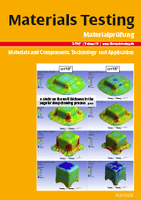
Materials Testing
Advancing the Science of Materials TestingMaterials Testing is a renowned journal published by Walter de Gruyter GmbH, serving the global scientific community in the fields of Materials Science, Mechanical Engineering, and Mechanics of Materials. With an ISSN of 0025-5300 and an E-ISSN of 2195-8572, this journal has been a significant contributor to the discourse on material performance, testing methodologies, and engineering innovations since its inception. The journal is recognized for its rigorous peer-review process and holds a commendable Q2 quartile ranking in multiple categories for 2023, showcasing its impact and relevance in the field. With open access options available, Materials Testing aims to disseminate valuable research findings and practical insights that drive advancements in technology and materials applications. By addressing the latest challenges and developments within the field, this publication serves as an essential resource for researchers, professionals, and students alike, fostering a deeper understanding of material properties and testing techniques.
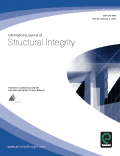
International Journal of Structural Integrity
Pioneering Research for Structural Integrity and InnovationInternational Journal of Structural Integrity is a premier peer-reviewed academic journal published by EMERALD GROUP PUBLISHING LTD in the United Kingdom. As a valuable resource in the fields of Civil and Structural Engineering, Mechanical Engineering, and Mechanics of Materials, this journal serves to advance knowledge and foster innovation in these critical areas of study. With an impressive impact factor reflected in its 2023 category quartiles, ranking Q2 across multiple engineering disciplines, the journal is recognized for its contributions to research and practical application. Researchers can benefit from its rigorous publishing standards that encompass a wide array of interdisciplinary topics pertaining to structural integrity. Accessing the journal is facilitated for those seeking high-quality research and findings, vital to both academia and industry. Since its inception in 2010 and extending until 2024, the journal continues to attract scholarly articles that push the boundaries of engineering knowledge, making it an essential platform for professionals, students, and researchers seeking to stay at the forefront of structural engineering."